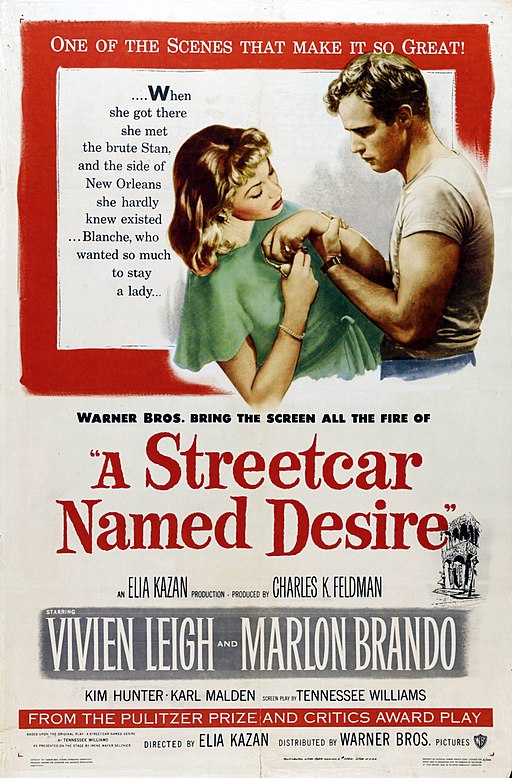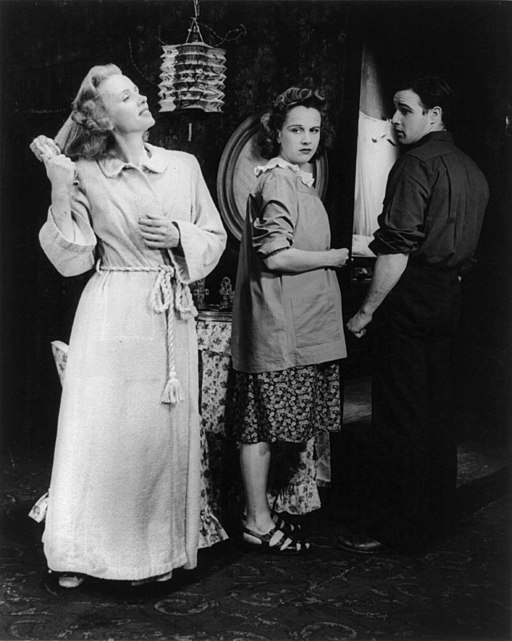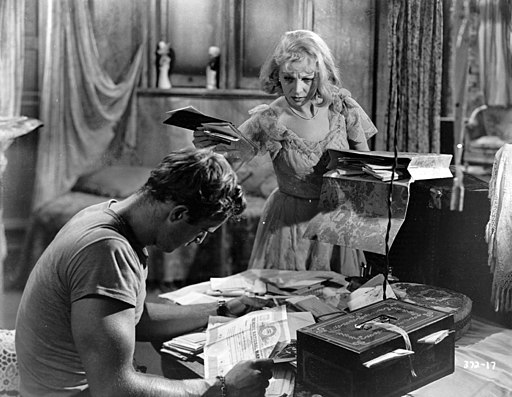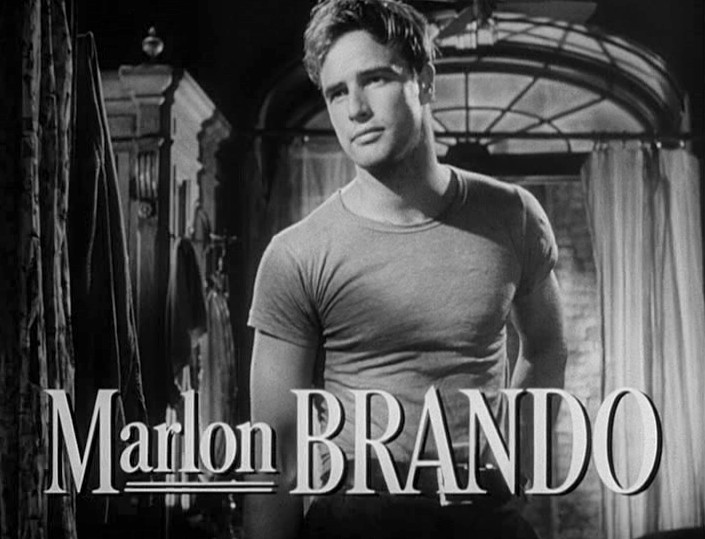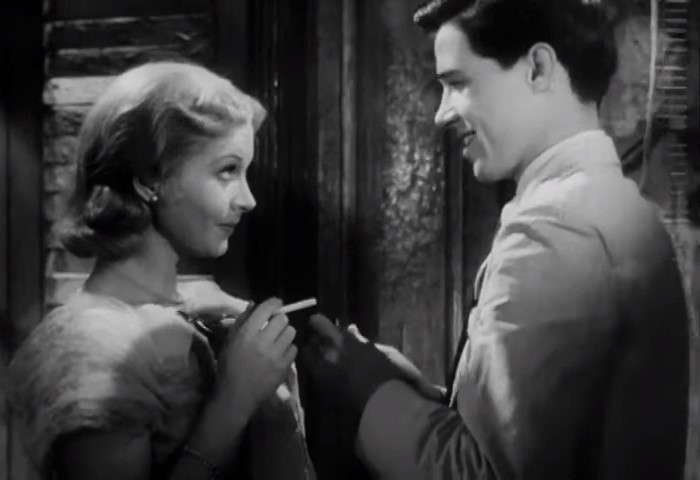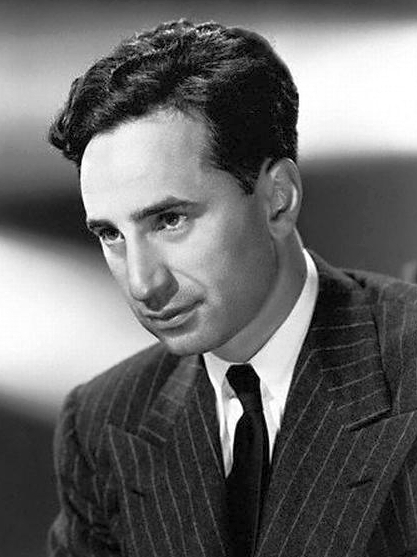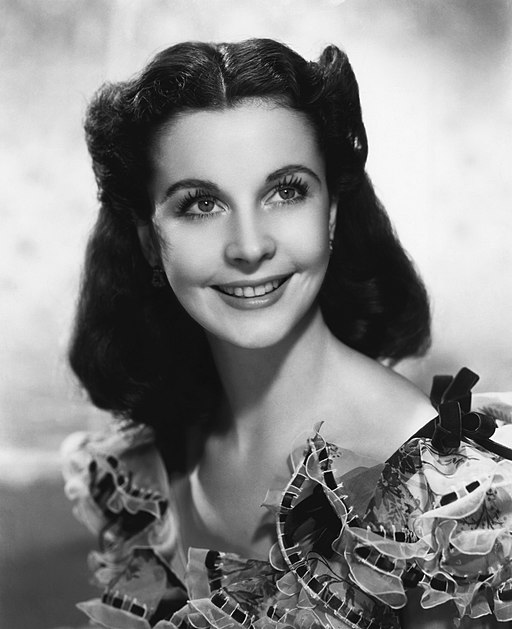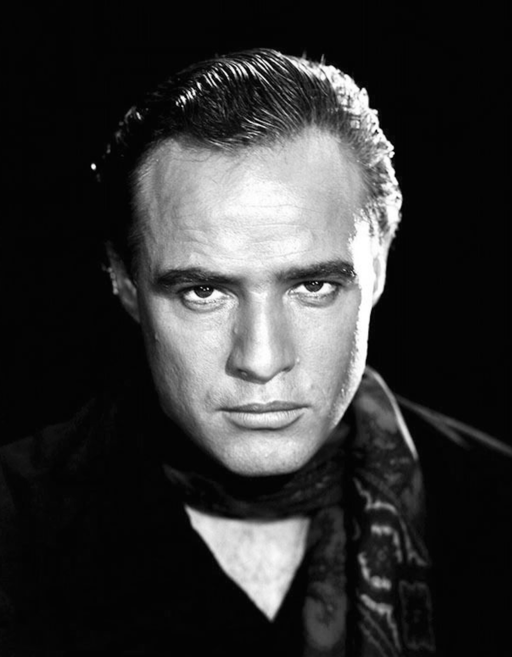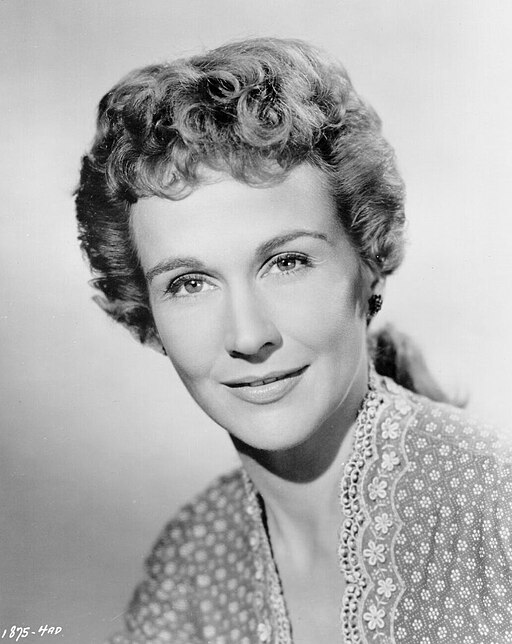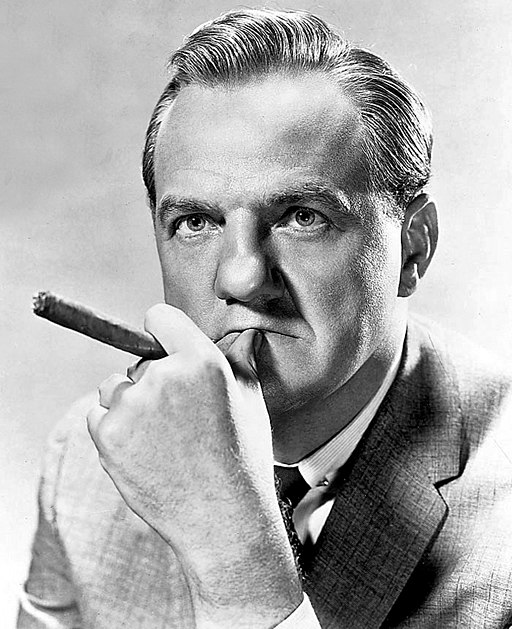A Streetcar Named Desire - 1951
back| Released by | Warner Bros. |
| Director | Elia Kazan |
| Producer | Charles K. Feldman |
| Script | Tennessee Williams (play), Oscar Saul (adaptation) |
| Cinematography | Harry Stradling |
| Music by | Alex North |
| Running time | 122 minutes |
| Film budget | $1.8 million |
| Box office sales | $ 4.2 million |
| Main cast | Vivien Leigh - Marlon Brando - Kim Hunter - Karl Malden - Jessica Tandy |
A Streetcar Named Desire
Desire, Delusion and Vulnerability colliding with Brute Force
"A Streetcar Named Desire" is a classic 1951 film that is an adaptation of Tennessee Williams' Pulitzer Prize-winning 1947 play of the same name. Directed by Elia Kazan, who was also responsible for the Broadway stage production, the film is a dramatic exploration of complex themes such as desire, social class, and mental health, set against the backdrop of post-war New Orleans.
"A Streetcar Named Desire" is noted for its bold, realistic portrayal of difficult themes and characters, setting a new standard for American cinema in the early 1950s. It remains a critical and cultural landmark, celebrated for its direction, performances, and its profound impact on film and theater.
Related
A Streetcar Named Desire – 1951
"A Streetcar Named Desire" is a potent cinematic adaptation of Tennessee Williams' play that explores the tragic downfall of Blanche DuBois, a fading Southern belle with a fragile psychological state, who leaves her aristocratic background in Mississippi due to series of personal crises and moves in with her sister Stella and her brutish husband Stanley Kowalski in a cramped, steamy apartment in New Orleans.
Summary
The narrative begins with Blanche's arrival in the French Quarter, carrying her few possessions and the weight of her mysterious past. Her genteel manners and refined appearance contrast sharply with the raw, vibrant life of the working-class neighborhood and the primal energy of Stanley. From the outset, Blanche and Stanley clash due to their divergent backgrounds and values, setting the stage for the ensuing conflict.
Blanche's presence disrupts the Kowalski household, intensifying the existing tensions between Stella and Stanley. As Blanche seeks to regain her dignity and self-worth, she tells tales of her former grandeur and becomes romantically involved with one of Stanley's friends, Mitch, who, like her, is lonely and seeking connection. However, her attempts to rebuild her life crumble as Stanley, suspicious and contemptuous, delves into her past and uncovers unsettling truths about her fall from grace, including her lascivious history and the loss of the family estate.
The revelation of Blanche's past to Mitch leads to the disintegration of their relationship, leaving her emotionally devastated. Stanley's aggression towards Blanche escalates, culminating in a brutal act of violence that leads to her psychological breakdown. The film concludes with Blanche being led away to a mental institution, clinging to her delusions of an old suitor coming to rescue her, as Stella, torn between her sister and her husband, makes a heart-wrenching decision to leave Stanley, albeit with doubts and uncertainty about her future.
Analysis
Elia Kazan's direction masterfully captures the intense emotional and psychological undercurrents of Williams' play, using the claustrophobic setting of the Kowalski apartment to heighten the sense of entrapment and despair experienced by the characters. The film's visual style, characterized by stark contrasts and shadowy interiors, mirrors the turbulent emotions and moral ambiguity of the story.
Marlon Brando's portrayal of Stanley Kowalski redefined acting with its raw power and animalistic charisma, embodying the post-war disillusionment and the emergence of a more modern, complex masculinity. Vivien Leigh's Blanche is a tragic figure whose fragility and delusions are rendered with heartbreaking poignancy, offering a stark examination of the cost of societal expectations and the fragility of identity.
The film's exploration of themes such as desire, madness, and the brutal reality of the American dream provides a critical commentary on the post-war American society. It examines the destructive impact of class, gender dynamics, and the relentless pursuit of illusion over reality. The music by Alex North adds another layer to the film's emotional landscape, with its haunting score amplifying the tension and tragedy of the narrative.
"A Streetcar Named Desire" remains a milestone in American cinema for its uncompromising portrayal of complex characters and themes, its remarkable performances, and its influence on the direction of film and acting. It stands as a testament to the power of cinema to explore the depths of human nature and the precariousness of the human condition.
Official Trailer:
Full Cast of “A Streetcar Named Desire”:
- Vivien Leigh as Blanche DuBois
- Marlon Brando as Stanley Kowalski
- Kim Hunter as Stella Kowalski
- Karl Malden as Harold "Mitch" Mitchell
- Rudy Bond as Steve
- Nick Dennis as Pablo
- Peg Hillias as Eunice
- Wright King as A Collector
- Richard Garrick as A Doctor
- Ann Dere as The Matron
- Edna Thomas as The Mexican Woman
- Mickey Kuhn as A Sailor
Analysis of the Direction of Elia Kazan:
Elia Kazan's direction of "A Streetcar Named Desire" is a masterclass in adapting a powerful stage play into an equally compelling film. His approach to the material, actors, and cinematic techniques not only brought Tennessee Williams' story vividly to life but also left a lasting impact on filmmaking, particularly in the realm of performance and realism.
Psychological Depth and Realism
Kazan was known for his ability to draw deeply emotional and nuanced performances from his actors, and "A Streetcar Named Desire" is no exception. His background in theater, particularly with the Actors Studio, informed his approach to directing actors, emphasizing emotional truth and psychological depth. Under Kazan's direction, Marlon Brando delivered a raw and primal portrayal of Stanley Kowalski, which became a defining moment for method acting in cinema. Vivien Leigh’s performance as Blanche DuBois, contrasting Brando's, was layered with fragility and desperation, showcasing Kazan's skill in navigating actors through complex emotional landscapes.
Cinematic Techniques
Kazan's use of cinematic techniques to enhance the story's emotional impact and thematic depth is notable. He skillfully used the film's setting, a cramped New Orleans apartment, to create a sense of claustrophobia and tension that mirrors the psychological state of the characters. The use of lighting, shadows, and close-ups further amplified the emotional intensity and the characters' internal conflicts. Kazan's direction made the environment a character in its own right, contributing to the film's oppressive atmosphere and the characters’ escalating tension.
Adaptation and Interpretation
Adapting a play into a film requires a careful balance of fidelity to the source material and the utilization of film's unique storytelling capabilities. Kazan managed this balance adeptly, preserving the play's dialogue and dramatic intensity while making effective use of film techniques to expand its visual and emotional landscape. His interpretation of the play addressed themes of desire, social decay, and the clash between illusion and reality with a directness and intensity that cinema afforded him.
Legacy
Kazan's direction of "A Streetcar Named Desire" helped to redefine film acting and narrative storytelling. By prioritizing emotional authenticity and psychological complexity, he paved the way for a more naturalistic and method-driven approach to acting in Hollywood. The performances in "Streetcar" are often cited as some of the most influential in American cinema, largely due to Kazan's direction.
Moreover, Kazan's ability to navigate the censorship constraints of the time while still conveying the play's controversial themes demonstrated his adeptness as a filmmaker. He crafted a film that was both a product of its time and timeless in its exploration of human nature and societal pressures.
Performance of Vivien Leigh as Blanche du Bois:
Vivien Leigh's performance as Blanche DuBois in "A Streetcar Named Desire" is widely regarded as one of the most haunting and nuanced portrayals in the history of cinema. Leigh embodies Blanche's complex mix of fragility, delusion, desperation, and dignity with such depth that she elevates the character to a tragic figure of Shakespearean proportions. Her portrayal is a masterful study in the disintegration of a woman clinging to the remnants of her former life while facing her inevitable downfall.
Emotional Depth and Range
Leigh navigates a wide emotional spectrum, from moments of airy, almost whimsical nostalgia for her lost youth and grandeur, to intense vulnerability and fear as her reality crumbles. She delivers lines with a Southern belle's charm and grace, yet layers her performance with a palpable sense of anxiety and desperation. This duality in her character — the public façade and the private turmoil — is rendered with a precision that speaks to Leigh's profound understanding of Blanche's psyche.
Physicality and Expression
Leigh's physicality in the role adds another layer to her performance. Her movements, gestures, and facial expressions convey volumes about Blanche's state of mind and her attempts to maintain a veneer of social grace and allure. Leigh's ability to manifest Blanche's inner decay through subtle changes in her demeanor — a nervous twitch, a fleeting look of panic, the way her voice breaks on certain words — enriches the character's psychological depth.
Interaction with Co-stars
The dynamic between Leigh's Blanche and Marlon Brando's Stanley is electric and serves as a critical element of her performance. Leigh uses their interactions to highlight Blanche's vulnerability and desperation, as well as her disdain and fear of Stanley's brutishness. Her scenes with Kim Hunter (Stella) and Karl Malden (Mitch) further reveal Blanche's complexity, showcasing her manipulative yet genuinely affectionate sides. Leigh's ability to oscillate between strength and fragility in these relationships underscores her character's tragic trajectory.
Conveyance of Blanche's Delusion and Descent
Perhaps the most compelling aspect of Leigh's portrayal is her conveyance of Blanche's gradual descent into madness. As her character's delusions and lies begin to unravel, Leigh masterfully portrays Blanche's retreat into a fantasy world as a defense against the harshness of her reality. The final scenes, where Blanche is led away, broken and detached from reality, are delivered with a heartbreaking poignancy that cements Leigh's performance as iconic.
Legacy
Vivien Leigh's Blanche DuBois is a tour de force of acting, blending technique, emotional authenticity, and a deep empathy for the character. Her performance not only defined her career but also set a standard for portraying complex, troubled women on screen. Leigh's Blanche is a testament to her exceptional talent and remains a pivotal reference point in film and theater studies. Through her portrayal, Leigh explores themes of fragility, delusion, and the destructive power of societal expectations, leaving an indelible mark on the legacy of cinematic performances.
Analysis of Marlon Brando’s interpretation of Stanley Kowalski:
Marlon Brando's performance as Stanley Kowalski in "A Streetcar Named Desire" is nothing short of revolutionary, marking a pivotal moment in film acting that influenced generations of actors and filmmakers. Brando brought an intensity, authenticity, and raw physicality to the role that was virtually unprecedented in cinema at the time. His portrayal of Stanley is a complex blend of brute force, vulnerability, and charisma, making the character both menacing and magnetic.
Raw Physicality and Intensity
Brando's physical presence in the film is commanding and imbued with a primal energy that perfectly encapsulates Stanley's animalistic nature. His movements, whether in moments of violence or tenderness, are executed with a naturalism that pulls the audience into Stanley's world. Brando's use of his body, from his imposing posture to the subtleties of his facial expressions, conveys a depth of emotion that words alone could not achieve. This physicality becomes a language of its own, through which Brando communicates Stanley's inner turmoil, aggression, and vulnerability.
Emotional Authenticity
What sets Brando's performance apart is not just his physical portrayal of Stanley but also the emotional authenticity he brings to the role. He peels back the layers of Stanley's masculinity to reveal a complex character driven by insecurity, pride, and a deeply ingrained sense of possession over his life and his wife, Stella. Brando's ability to switch from explosive anger to sullen vulnerability showcases his exceptional range and deep understanding of the character's psychological landscape.
Method Acting Approach
Brando's performance is often cited as a seminal example of Method acting on film. He lived the part, bringing a realism to the role that was informed by his own emotional experiences and memories. This approach allowed him to inhabit Stanley fully, giving a performance that felt lived-in and authentic. Brando's portrayal transcends mere acting; it feels like a genuine glimpse into the life of a deeply flawed man struggling with his own limitations and desires.
Interaction with the Cast
The dynamic between Brando's Stanley and the other characters adds layers to his performance. His interactions with Vivien Leigh's Blanche are charged with tension, highlighting the clash between Stanley's raw masculinity and Blanche's fragile, aristocratic demeanor. The scenes with Kim Hunter's Stella reveal the complexity of Stanley and Stella's relationship, blending tenderness, passion, and dominance in a way that feels uniquely real and compelling.
Legacy
Marlon Brando's portrayal of Stanley Kowalski broke new ground in film acting, challenging conventional notions of masculinity and performance. His embodiment of Stanley left an indelible mark on cinema, influencing not only the method and approach to acting but also the portrayal of masculine characters in complex, nuanced ways. Brando's performance in "A Streetcar Named Desire" remains a benchmark for actors, a masterclass in blending physicality, emotional depth, and realism to create a character that is as unforgettable as it is influential.
Important Quotes from the Film:
Blanche DuBois: "I have always depended on the kindness of strangers."
- This line, delivered by Blanche towards the end of the film, encapsulates her vulnerability and the tragic trajectory of her life, as she continually seeks solace and escape in the illusions she creates around herself.
Stanley Kowalski: "Hey, Stella!"
- Stanley's raw shout for his wife is one of the most iconic moments in both the play and the film, showcasing his primal nature and the intense, tumultuous relationship between Stanley and Stella.
Blanche DuBois: "I don't want realism. I want magic!"
- This quote reflects Blanche's refusal to accept reality and her desire to live in a world of her own making, where she can maintain her illusions of grandeur and innocence.
Stanley Kowalski: "Every man is a king! And I am the king around here, so don't forget it!"
- Stanley's declaration of his authority in his home underscores the themes of power, dominance, and masculinity that are central to his character and his conflicts with Blanche.
Blanche DuBois: "After all, a woman's charm is fifty percent illusion."
- This line gives insight into Blanche's understanding of herself and her reliance on appearance and charm to navigate the world, highlighting her manipulation of reality to preserve her self-image.
Blanche DuBois: "Death is expensive, Miss Stella!"
- Blanche says this in reference to the losses of their family estate, Belle Reve, and the burden of deaths in the family she had to deal with, which hints at the financial and emotional costs of maintaining the façade of Southern gentility.
Mitch: "You need somebody. And I need somebody, too. Could it be you and me, Blanche?"
- Mitch's proposition to Blanche highlights the theme of loneliness and the human need for connection, underscoring the fragile hope for redemption and happiness that Blanche clings to.
Blanche DuBois: "The opposite of death is desire."
- This line encapsulates one of the central themes of the play and film, the driving force of human desire in its many forms, and its role in the characters' lives, offering a profound reflection on the nature of human existence.
Awards and Recognition:
Academy Awards (Oscars)
- Won:
- Best Actress in a Leading Role: Vivien Leigh (Blanche DuBois)
- Best Actor in a Supporting Role: Karl Malden (Mitch)
- Best Actress in a Supporting Role: Kim Hunter (Stella Kowalski)
- Best Art Direction-Set Decoration, Black-and-White: Richard Day, George James Hopkins
- Nominated:
- Best Picture
- Best Actor in a Leading Role: Marlon Brando (Stanley Kowalski)
- Best Director: Elia Kazan
- Best Writing, Screenplay: Tennessee Williams
- Best Cinematography, Black-and-White: Harry Stradling Sr.
- Best Costume Design, Black-and-White: Lucinda Ballard
- Best Sound, Recording: Nathan Levinson (Warner Bros.)
- Best Film Editing: Al Clark, Verna Fields
- Best Music, Scoring of a Dramatic or Comedy Picture: Alex North
British Academy Film Awards (BAFTAs)
- Won:
- Best British Actress: Vivien Leigh (Note: At the time, BAFTA awards could be given to performances in films not exclusively British.)
Golden Globe Awards
- Nominated:
- Best Motion Picture – Drama
- Best Director – Motion Picture: Elia Kazan
- Best Actor – Motion Picture Drama: Marlon Brando
- Best Actress – Motion Picture Drama: Vivien Leigh
Other Honors and Recognitions
- New York Film Critics Circle Awards:
- Won: Best Actress - Vivien Leigh
- Venice Film Festival:
- The film was entered into the festival and received critical acclaim, though it did not win in the competitive categories.

